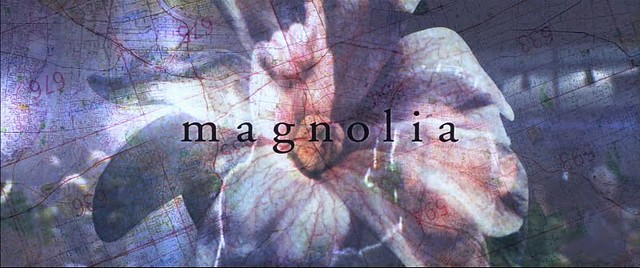
Much like I did to Dr. Strangelove the other night, I actually combed through this film with my thumb on the pause button and wrote down each story beat as I went so I could better analyze the structure of a multi-plotline ensemble film. Of course, Dr. Strangelove is a 90-minute high-concept story with very few scenes, locations, and characters. It has virtually no subplots, just a handful of threads that all tell their part of a single story. By contrast, Magnolia is a 3-hour tapestry of nothing but low-concept subplots (and one big Event), so it actually took a lot more out of me to write it all down.
Two dying fathers suffering the regrets of their earlier dalliances -- both of whom cheated repeatedly and flagrantly on their wives; one who may have/probably did abuse his daughter and the other who abandoned his dying wife and teenage son when the scene got a little too "real" for him. The daughter has become a coked-out wreck who takes home strange men and lives like an angry child, unwilling and unable to let go of her past. The son has become a self-styled exaggeration of the aggressive macho bullshit he saw in his father, a stunted man-boy unwilling and unable to acknowledge the existence of his past. The first father is the host of a popular game show produced by the second father's company. The daughter has a chance encounter with a loser cop on a particularly bad day and the two awkwardly agree to fall in love and help support each other (in a dynamic later explored under different-but-similar circumstances in P.T. Anderson's next film), and although she never reconciles with her father, she at least manages to reconnect with her mother. The son doesn't quite reconcile with his father, but he at least acknowledges through catharsis his father's role in his life and admits to needing him not to die.
On the other side of the spectrum, two damaged boys. One, a former "quiz kid" from the 60s (living in the shadow of his past), now an adult with more neuroses and problems than can easily be counted, who loses his job, drunkenly embarrasses himself in front of the big-dumb-pretty bartender he's in love with, and robs his former employers in order to pay for braces he doesn't need to be somehow closer to the bartender. The other, a current "quiz kid" with no friends other than books (living the past that will overshadow his future?), and already well on his way to his own highly complicated set of neurotic tics and phobic anxieties. In the middle, bridging these distant poles: a shy but compassionate male nurse; a manic and/or bipolar golddigger who's grown a conscience; and the adorable, affable loser cop mentioned before.
The pacing is pretty intense throughout, I realized, and one of the ways it manages to keep so much story going at once is with a surprising number of rapidfire montages, often set to music. That none of it's boring or just feels like spinning plates is testament to a lot of strong characters and stories. That the dialogue could be this stylized and the tension this high for so long (and the emotions and tones so varied from story to story) without ever collapsing or tearing itself apart is again testament to the strength of the story.
At the time this was released, I considered this one of the greatest films I'd seen in the last ten years or so. Now, especially if I compare it to Punch-Drunk Love and There Will Be Blood, the film comes off a lot more poppy and overpolished than I remembered. It's amazing to return to a massive, unmarketable three-hour film like this -- one that Anderson was only able to make because Boogie Nights was such a huge success, and he struck while the iron was hot -- can come off so commercial feeling, but there it is. As good as Tom Cruise's breakdown scene is (and it's still good), it comes off as the "big Oscar moment" for the "big bankable actor," even if he's playing against type (and yet, playing so perfectly into his own public image). The quirkiness and originality of it (structure, tone, the climactic self-conscious deus ex machina) are all a lot less refined and confident, almost too bombastic and bold -- not refined enough, maybe -- when you look at his next two works.
But Magnolia holds up well. It makes me nostalgic for Aimee Mann songs, makes me love intense/vulnerable Melora Walters, makes me miss dramatic actor John C. Reilly, makes me look back in wonder to an era where nobody's heard of Patton Oswalt, or Philip Seymour Hoffman, or where small cameos by Luis Guzman, Clark Gregg, Mary Lynn Rajskub, Felicity Huffman, and even William Mapother (Ethan from Lost! ...also Tom Cruise's cousin) might go almost unnoticed. And now I have an intricately charted beat-sheet to go through sometime, and see what kind of wisdom I can glean from it, how ensembles can be put together, and how you keep so many engines running all at once without a story falling apart. (Something to look forward to, when it's not four in the morning!)

No comments:
Post a Comment